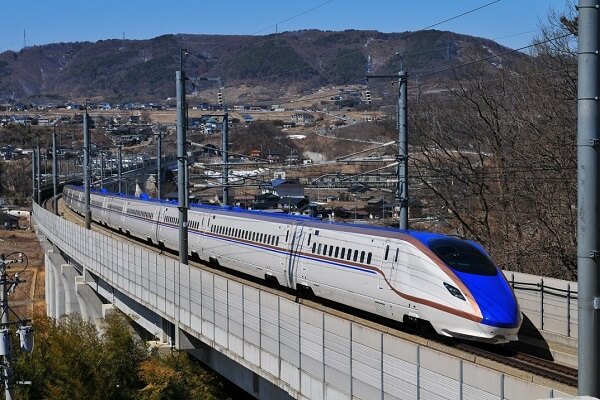SATEBA acquires Rail Business of De Bonte Group in Belgium
 Regent to launch High-Speed Seagliders to transform coastal transportation in UAE
Regent to launch High-Speed Seagliders to transform coastal transportation in UAE California commences construction on $12bn Los Angeles - Vegas High Speed Rail Project
California commences construction on $12bn Los Angeles - Vegas High Speed Rail Project Kochi Water Metro floats tender to procure 15 more electric-hybrid ferries
Kochi Water Metro floats tender to procure 15 more electric-hybrid ferries Siemens Mobility-Hassan Allam Construction JV Sign Contract for UAE – Oman Railway Link
Siemens Mobility-Hassan Allam Construction JV Sign Contract for UAE – Oman Railway Link What is better public transport option for Bengaluru - RRTS or Metro Expansion?
What is better public transport option for Bengaluru - RRTS or Metro Expansion? Behind Closed Doors: Corruption Uncovered in Delhi Metro's Top Management
Behind Closed Doors: Corruption Uncovered in Delhi Metro's Top Management IndiGo to launch Urban Electric Air Taxis between Delhi to Gurugram
IndiGo to launch Urban Electric Air Taxis between Delhi to Gurugram Swisspod secures Strategic Investment to advance the Hyperloop Transportation
Swisspod secures Strategic Investment to advance the Hyperloop Transportation Siemens Mobility revolutionizes Copenhagen's S-bane Network with Driverless Technology
Siemens Mobility revolutionizes Copenhagen's S-bane Network with Driverless Technology
IWD Special: An Exclusive Interview With Ms. Mio Oka, Country Director, ADB India
 Ms. Mio Oka, Country Director, ADB India
Ms. Mio Oka, Country Director, ADB India
Ms. Mio Oka has recently assumed the pivotal role of Country Director for India at the Asian Development Bank (ADB). Tasked with overseeing ADB operations in India, she aims to foster robust relationships with the government and other development partners in the country.
Ms. Oka brings nearly three decades of professional experience to the table, with over 18 years dedicated to ADB, where she has held various roles since joining as a project specialist in 2005. Having served as an advisor to the President for six years and later as a director in the agriculture and natural resources sector, covering the South Asia region and Emerging Areas team for over seven years, she brings a wealth of knowledge to her new position. Before her tenure at ADB, Ms. Oka worked with the Ministry of Foreign Affairs of Japan, the Japan Bank for International Cooperation, and the Japan International Cooperation Agency (JICA), Bangladesh Office.
Armed with a master’s degree in social policy and planning in developing countries from the London School of Economics and a bachelor’s degree in development studies and politics from the University of London, Ms. Oka is well-equipped to lead ADB’s country partnership strategy for India from 2023 to 2027. This strategy is strategically designed to catalyze robust, climate-resilient, and inclusive private sector-led growth in the country.
In an exclusive interview with Urban Transport News, Ms. Oka shares her vision and strategy for sustainable development in India's rail and transport infrastructure sectors. Here are excerpts:-
Congratulations on your appointment as the new Country Director for India at ADB. What specific goals and strategies do you plan to implement to further strengthen ADB's partnership with the Indian government and support its development agenda?
Thank you. It is my great honor to have this opportunity to lead ADB operations and continue our strong partnership with India. We, at ADB, value highly the trust the Government of India (GOI) has reposed in the bank since the start of our operations in 1986. As Country Director, I look forward to further solidifying this partnership to support the country’s development ambitions. Overall, we aim to help India achieve robust growth, with climate and private sector focus keeping inclusive development goals in mind. The strategic roadmap for this engagement is already charted in the Country Partnership Strategy or CPS for 2023-2027, prepared in consultation with GOI and approved by the ADB Board in May 2023. This will be achieved through accelerated structural transformation and job creation, addressing infrastructure gaps, promoting climate-resilient green growth, and enhancing social and economic inclusiveness while deploying smart technologies and innovations. ADB will combine financing, knowledge support, and partnerships to offer integrated solutions and ensure optimal development impact.
ADB has been a crucial partner in supporting India’s development goals since 1986. How do you envision continuing this collaboration, especially in addressing critical challenges in infrastructure, human development, and climate risk vulnerability?
Let me address the three areas you highlighted. First, we remain committed to support India’s national goal of strengthening infrastructure under the PM Gati Shakti Program and the National Infrastructure Plan. Our financing will be directed to support multisectoral areas such as logistics, industrial estates, and economic corridor development. To improve the quality of life in urban areas and promote cities as engines of economic growth, ADB is supporting the expansion of universal coverage of basic urban services. Second, for strengthening human capital, ADB has been increasing investments in skills, education, and health sectors besides promoting rural development. Last but not least, supporting India’s climate agenda will remain at the front and center of our India program in the next 5 years. We will assist in mainstreaming climate change mitigation and adaptation initiatives across all sectors. Our support will be anchored in the decarbonization of transport, clean energy transition, circular economy, integrated water resource management, and climate adaptation focusing on disaster resilience.
Urban transport in India is undergoing significant changes due to rapid urbanization. What role do you see ADB playing in promoting efficient and sustainable urban transport systems and mobility solutions in the country?
Urban transport is critical in managing urbanization more efficiently. Our support has been mostly for metro rail and rapid rail transit projects in the context of the decarbonization of transport. Moving forward, ADB’s India CPS puts a high priority on supporting mass transit systems and the accelerated transition to e-mobility transport solutions, such as e-buses, charging infrastructure, and catalyzing private finance, including PPP. ADB also actively provides technical assistance to the Ministry of Housing and Urban Affairs, various state agencies, and transit companies in the areas of policy formulation, and identifying Transit Oriented Development opportunities. These initiatives enhance urban liveability and resilience by fostering better integration between land use policies and the expansion of transport networks in urban areas.
The demand for urban transport in India is intensifying, and ADB has a history of financing metro rail projects. Could you share your insights on how ADB plans to contribute to the expansion and enhancement of metro rail systems in Indian cities?
In addition to supporting the infrastructure for metro rail projects, ADB is keen to expand finance-plus elements from value additional point of view. Our main contributions will aim to foster Transit transit-oriented development along transit corridors, build the capacity of metro companies and planning agencies on multimodal integration, implement land value capture, and enhance non-fare box revenue streams to improve the financial sustainability of metro operations. These initiatives will also increase ridership, leading to more robust revenue streams.
With a significant portfolio committed to India in 2023, including sovereign lending, technical assistance, and grants, what key sectors and projects will ADB focus on to ensure inclusive, resilient, and sustainable growth in the country?
As earlier stated, our assistance to India is guided by the CPS and aligned with India’s development priorities. We will support projects and programs that will accelerate structural transformation and job creation through the convergence of logistics–industry–urban–skilling programs, coupled with support for micro-, small-, and medium-sized enterprises. In parallel, we will expand assistance to education, health, social protection, and rural development to support the objective of inclusive and broad-based development. Geographically, our support will focus on lagging states and underdeveloped districts of high-income states. Apart from that, our projects consciously incorporate inclusiveness elements towards gender, lower-skilled workers, at-risk communities, and aspirational states while incorporating sustainable solutions.
As ADB's role in India extends to financing railways and transportation infrastructure, how do you plan to address the challenges and opportunities in these sectors, considering the increasing need for sustainable and innovative solutions?
ADB will explore innovative mobility solutions such as ropeways, light rail transit (Metro-Neo), in addition to e-buses and e-vehicles for last-mile connectivity. ADB is also providing technical assistance for decarbonization of transport particularly for the railway sector to meet the objectives of the Paris Agreement on Climate Change.
The upcoming International Women's Day is a celebration of women's achievements. As a woman leader in a prominent position, how do you see ADB contributing to gender equality and empowerment, particularly in the sectors you oversee?
Accelerating progress in gender equality in Asia and the Pacific region is an operational priority of ADB’s Strategy 2030 and a key priority of India CPS. Our India operations aim to accelerate progress in gender equality by empowering women and girls in areas such as education, health, financial inclusion, decision-making and leadership, and promoting women’s resilience to external shocks. With gender equality mainstreamed at all levels, more than 90% of our approved and pipeline projects in 2023 and 2024 incorporate gender mainstreaming elements. Looking ahead, a gender equality and social inclusion (GESI) laboratory is proposed to identify gender-themed initiatives and build on gender mainstreaming activities at the project level with provision to strengthen the capacity of project implementing agencies in promoting gender initiatives.
ADB has committed to eradicating extreme poverty and achieving sustainable development. How do you envision ADB's role in promoting inclusive and resilient growth in India, considering the diverse challenges faced by different regions and states in the country?
As I have mentioned, ADB will continue to expand our support to the social sector to help build human capital, especially for low-income and marginalized groups, thereby, increasing their potential to participate in economic activities. Personally, having recently switched from the agriculture sector, we see the role of rural development in addressing poverty while also keeping focus on basic urban services, prioritizing lagging states and districts. In addition, to meet the divergent needs of states, ADB pursues a differentiated approach. For low-income states, we prioritize projects on basic services, critical infrastructure and services, institutional strengthening, and private sector development through strategic long-term engagement. Support to higher and middle-income states/cities would promote innovation, scalable models and focus on transformational programs with policy and knowledge advice. In addition, ADB has introduced a new funding modality, project readiness financing (PRF), to help states with limited capacity in preparing readily investable projects. The financing is used to help executing agencies' project preparation activities, such as detailed engineering design, preparation of safeguards and bidding documents, and upfront capacity building. ADB has already extended this modality to several northeastern states and Himachal Pradesh.
In your opinion, what are the key challenges that women face in leadership positions, and what steps can be taken to overcome these challenges in the workplace?
I would say the important issue is to get more women in leadership positions. Research shows that putting more women in leadership positions can raise productivity and address broader development outcomes. At the organizational level, ADB proactively promotes equal opportunities for growth and career development. But yes, speaking broadly of Asia and the Pacific region, there is vast scope to improve the proportion of women in leadership positions in both public and private sectors. Let me take this opportunity to mention an important initiative, the Asia Women Leaders Program, that ADB launched to address the glaring absence of women in leadership roles in the region. The program provides targeted leadership training for senior government officials in areas such as effective communication and negotiation, to help them overcome barriers faced by women as they progress in their careers.
As a woman leader with extensive experience in international development, what message do you have for women aspiring to excel in leadership roles, especially in sectors traditionally dominated by men?
Today, there is hardly any sector that does not have women contributing to its growth. Women can bring diverse perspectives to problem-solving and decision-making that can lead to better decisions. My message to women aspiring to excel in leadership roles, especially in the non-traditional sectors, would be to be more expressive, share your achievements, don’t hesitate to say no, break the stereotypes, and be a role model. Let me also say that beyond the competitiveness of a workplace, women must also keep in mind to take care of their health, value themselves, and be happy in whatever role they play.







